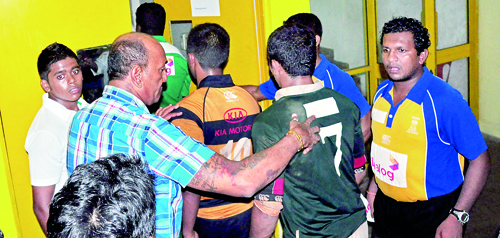Injured as a player – come join the referee ranks
View(s):The best of the pick from schools form the side’s whites and reds and battled out yesterday at Race Course. The performers at this level will step into the wider arena of rugby hopefully to be performers in the National Rugby scene. Immediately a pool will be picked in preparation for the Under 19 Junior Asiad.
Others may fall by the way as they honeymoon with rugby outside the school and find that it is not what they really expected. Yet there will be some who will fade away after this school season as they will feel the pressure of injury. Recently I met a rugby captain of a school who did admirably well in the 2013 season. On talking to him about his future in the game he told me that he has not played any rugby since he left school. The result of an injury he sustained in school and continuing to play with that injury has taken him virtually out of the game. I told him that he should not consider that he is out of the game as he has a path to continue as a referee. That is provided he is willing to take that path as most prefer to turn the face away from the headquarters of the referees society.

Sri Lanka -- probably one of the few places on earth where spectators are more focused on the referee, than the ball or the game - File pic
Rugby is such a wonderful game that provides a thrill more than most other sport. A player goes through many stages to reach the top include an early stage of Fun, Development Participation Preparation and Performance. In the eyes of the stakeholder it is the fun stage that that goes through a metamorphosis without training and learning process but leads to seek a thrill form the game. When I say stakeholder it includes many such as Administration, Old Boys, Advisory Groups, Parents and Coaches. Sometimes it is the thrill for themselves that they seek and neglect of the school boy. If not why do engage the services of a player who is and or has not recovered from an injury. Because we want a win and that is a Key Performance Indicator that is followed. Those who have failed to win start wielding the axe and the heads of coach’s roll and recruitment of new coaches begin. The asking rates are getting higher and offers are equally good. This means more money spent and if and when you lose the stone has only one direction to travel and that will be the referee.
The overzealous spectator is not a home grown problem but has been seen elsewhere. In Wales early this year a person supposed to be a parent tripped a player who was heading towards the goal line as he could not stomach the team of his son getting bashed. Elsewhere Bryncoch RFC created a poster, which read: ‘Please remember. The players are children. The coaches are volunteers. And the referees do not see everything. This is mini/junior rugby, not the final of the world cup. Enjoy the game and your visit to Bryncoch RFC.’
Wanting to see his son play in a winning team is parental instinct which is biological. Coaches want to win as this enhances his performance measurement or salability. Schools administrators want a win because it is good for the profile. A wining rugby team gets more publicity than the academic results even it be that 75% student have got A and selected to University. The important thing in all these reasons to win must be underscored by the need to instill desirable virtues.
The schools roots go back in time when it was adopted to instill desirable virtues in the minds of the young. This is very much evident when you read the principles of the game even today.
Football was popular in public schools as a recreation for the boys when not studying. The various schools played to their own rules,

From fiefdom to freedom...?
developed by the pupils themselves. Rugby School was a fore runner to the game of rugby as it developed to this stage. The rules at Rugby School initially forbade handling the ball on the field of play, unless the ball was airborne, in which case it could be caught. The catcher stood still, as did all other players.
In the mid-1820s the boys started to catch the ball and, instead of standing still, ran with the ball in their arms towards the opponents’ goal line. By the 1840s this had become the norm.
When the boys of Rugby School left, they took the game with them. Clubs sprang up all over England and in the colonies where they worked, either as service personnel or administrators.
Thus the game that spread form the elite Rugby School took root on Sri Lanka among the better known public schools of that era as a sport that would instill desirable virtues.
Since 1995 the game became professional and payers coaches as well were paid and the ethos of the game changed. But still the laws of the game stress on the same points of rugby being a game for all and belonging to the global rugby family. The tragedy is that we are slowly moving out of these norms not because the game has spread but because those that are involved don’t seem to understand the philosophy.
Vimal Perera is a former Rugby
Referee, coach and Accredited Referees Evaluator IRB


